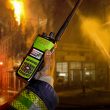Public-safety organizations formalize alliance, push for D Block
An ad-hoc group of key public-safety organization formalized its partnership yesterday with the launch of the Public Safety Alliance, which hopes to use national advertising and grassroots campaigning to convince Congress to reallocate the 700 MHz D Block to public safety.
“We wanted to bring more structure to it,” said Dick Mirgon, president of the Association of Public-Safety Communications Officials (APCO). “There clearly needs to be additional work on educating people in Washington, D.C., on the issue.”
Technically a program of APCO, the Public Safety Alliance includes APCO, the International Association of Chiefs of Police, the International Association of Fire Chiefs, the National Sheriffs’ Association, the Major Cities Chiefs Association, the Metropolitan Fire Chiefs Association, the Major County Sheriffs’ Association and the National Emergency Management Association.
Mirgon said the some lawmakers on Capitol Hill favor D Block reallocation to public safety, while others believe the D Block should be auctioned early next year, as the FCC has planned.
“[But] there’s a whole lot more people who are undecided,” he said. “Our endeavor is to educate the people that are undecided.”
For the past year, public-safety organizations have been seeking reallocation of the 10 MHz D Block, which would be paired with the 10 MHz of public-safety broadband spectrum licensed to the Public Safety Spectrum Trust (PSST), to provide the spectral foundation for a nationwide, wireless broadband network for first responders.
FCC officials have said they believe the PSST spectrum is enough to address public safety’s broadband spectrum needs in most cases. When an emergency result in first responders needing additional spectrum or capacity, the FCC proposal calls for public safety to use commercial networks via priority roaming. FCC officials believe that access to the commercial networks also would provide additional redundancy and reliability.
“The FCC’s plan — supported by the co-chairs of the 9/11 Commission — will ensure the build-out of a network that is cutting edge, reliable, and cost-effective,” FCC spokesman Rob Kenny said in a prepared statement. “We have already taken the first steps with the creation of the Emergency Response Interoperability Center and the approval of 21 waivers for states and localities to begin early build-out of their networks. We look forward to our continued work with public safety to make this vitally important network a reality.”

















